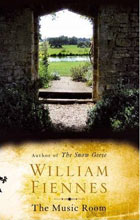 William Fiennes's memoir of growing up in an English medieval castle that has been in his family for six centuries sets the perfect gentle, elegiac tone to usher in summer and our upcoming trip to England. It begins:
William Fiennes's memoir of growing up in an English medieval castle that has been in his family for six centuries sets the perfect gentle, elegiac tone to usher in summer and our upcoming trip to England. It begins:The school assembly hall was closed for renovations and on Sundays we walked to a church for our weekly service. We spread rumours along pews and daydreamed through sermons until one visiting preacher secured our attention by hoisting a bag onto the pulpit rim - a scuffed black leather bag with accordion pleats at each end, a bag a doctor might take on night visits - and unpacking metal stands and clamps we recognized from science labs, and various jars and packages he ranged along the shelf in front of him. He was in his fifties, dressed in a grey suit and a black shirt with a white dog collar, and he didn't say anything while preparing his equipment. tightening a clamp on a retort stand, fixing a cardboard tube between the jaws. He struck a match; a fuse caught and sizzled; he shook the match out and stepped back to watch the lame. Then we understood that what he'd clamped to the stand was a firework. The tube flared with a soft, liquid rush, sparks and white embers falling to the stone floor, the preacher's spectacles glinting in the brightness. The fountain died with a last sputter like someone clearing their throat, the after-image burning in our eyes.
'Light,' the preacher said.
There are so many pleasures in Fiennes's writing. His words choices are specific, not general, for example he has bothered to find out (or knows) the term 'retort stand' rather than employing a more general word. He is sparing in his use of commas, a choice I stylistically appreciate. His use of verbs is active and unexpected. They are not 'sitting' on pews but rather 'spreading rumours along' them. Metaphor and simile are used but not overused. The fountain died 'like someone clearing their throat.' Lovely. His precision leaves room for the reader to think, it doesn't grab frantically at our attention, desperate to hold on.
The tone of his memory calibrates our brain to the age at which his senses are taking in the information that he now writes of as an adult. For instance, I feel that he is a young boy in this next paragraph without his explicitly saying so. There is something in the diction - his 'haunting' the greenhouse and his having to 'dare' himself to approach the boiler room. There is the sense for me that these details of the scene are treasures. His voice communicates the wonder with which his eye takes in the visions of his childhood world.
Often I crossed the bridge over the brook and pushed through the iron gates into the kitchen gardens. I haunted the long, low Victorian greenhouse with broken panes, wasps crawling the windfall from apple trees, cobwebs sagging off the roofwork, a debris of smashed pots and a narrow brick walkway between rotten, mossed-over work-benches, rich plant gas coming off the nettle clumps. I had to dare myself to approach the musty half-underground darkness of the boiler room at the far end...
I am enveloped in his sensoral world and yet the perspective of his current age penetrates the memory:
What I liked best was the sound of her tuning the viola, the way she'd loosen the peg a fraction before bringing it up to the correct pitch, as if it was only by being first slightly mistaken in something that you could see the right answer clearly.
These warm but not sloppily sentimental memories are juxtaposed against the violence of his older brother Richard's epilepsy and the brain damage suffered by him from the seizures. Interspersed among the wasps,the wafting music, his mother oiling the armor with WD-40, and his father giving historical tours to visitors to the old castle are passages about Fritsch and Hitzig's applying electrical stimulating the cortex of animals and uncovering the motor cortex. Fiennes uses a more intellectual approach and contrasting textures to write about his brother's illness and the counterpoint its rhythms created against those of the medieval castle that was his family home.
Despite the level of detail I am relating to you about reading Fiennes's The Music Room, half of it whipped by in a couple of sittings and I hope I will finish it today. While in England, I will try to pick up his first book, The Snow Geese, as well. By the way, my order from the The Book Depository did come in, so let me sing their praises. If you do not live in England but are looking for books published and released there (as well as elsewhere), they are well-stocked, reliable, and fast, they deliver worldwide for FREE, and they have nifty bookmarks.
















1 comment:
This book sounds wonderful, exactly the kind of writing I love. I wish I had read this yesterday when I placed an order with The Book Depository (I wholeheartedly second your praise!) But I'll keep this one in mind for my next order.
Post a Comment